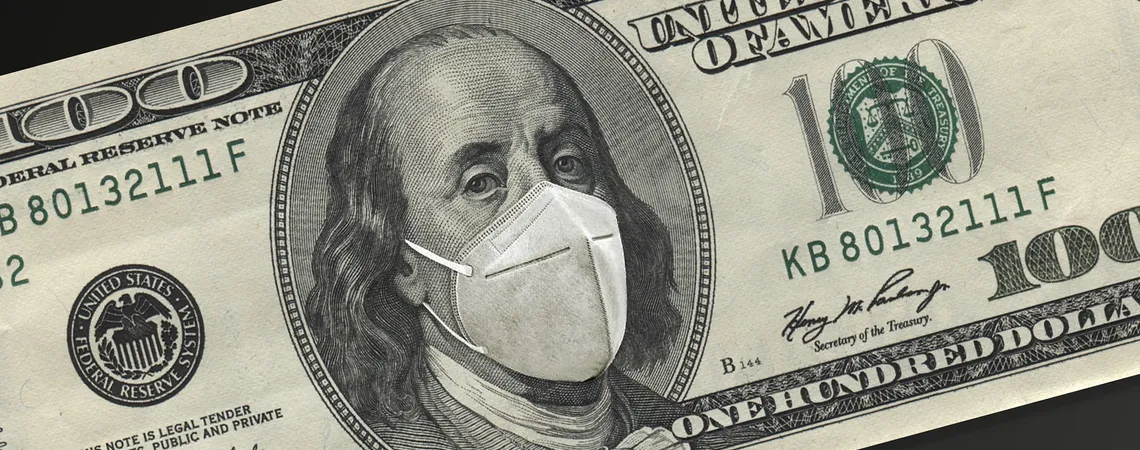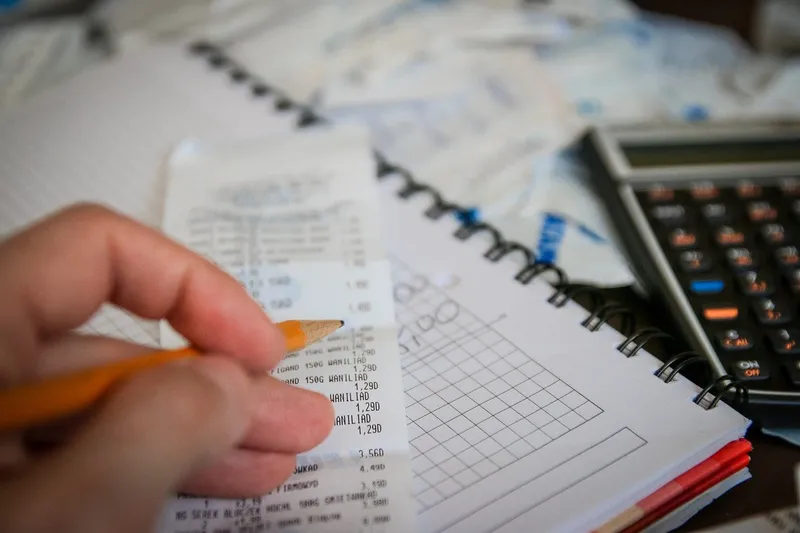How to Repair Your Credit After Covid-19
Posted on 25 July, 2022 by MIRANDA BOTTAS in Сredit Repair

How to Repair Your Credit After Covid-19
It's been well over two years since the initial financial impact began in the United States as a direct result of the global Covid-19 pandemic. The lockdowns that followed caused individuals and businesses alike to feel the pain in their wallets and bottom lines within weeks - and in some cases it took only mere days. Restricted to making essential purchases only and with recommendations to not leave home in an effort to curb the spread of the virus, most small brick and mortar businesses came to a screeching halt.
From hair salons and clothing stores to construction sites, shopping centers and even many restaurants - almost everything changed in an instant. People weren't working. Schools and day care centers were closed. Offices were temporarily closed and people were advised to work from home (if possible) until further notice. Panic, paranoia, and uncertainty was widespread. Most of us were glued to our TVs and internet news sites for the latest updates on something that we've never seen in our lifetimes - a near completely global shutdown of society and everything as we know it.
Many who were considered to be essential workers - such as those in healthcare, emergency services, supermarkets, and pharmacies - continued on with their jobs using strict preventative measures. But there were many more whose work came to a complete halt. No work, not even from home. No income. No idea when they would return to work, and with no plan on how to cover their bills, debts, and essential needs. Indeed it was a scary and unprecedented situation.
While many states rolled out government assistance programs, unemployment records shattered all-time highs. Not everyone who needed it was eligible for financial help. Many of those who received assistance quickly realized it wasn't sufficient to cover their bills, and turned to credit cards for even the most basic purchases. Some had no choice other than to max out their cards and fell deep into debt as a result. Worse of all, many of these people were unable to return to work for months. Others never returned at all, as the pressures of zero revenue caused employers to downsize or close their doors forever. Many businesses that planned temporarily closures were never reopened, leaving millions completely without work and with no financial solution in sight.
Dropping Credit Scores and Ever-Increasing Debts
As more and more people struggled, their credit and loans debts began to default. Housing payments, car payments, credit card payments and student loans were impossible to make for many of us. Tens of millions of people (if not more) began to default. And while laws were passed to provide protection from creditors and ensure that people didn't lose their homes, the aftermath is more consumer debt than any other time in recent history.

Fast-forward to today, and the legislation designed to protect consumers during the pandemic's peak expired long ago. Many banking, lending, and credit institutions were kind enough to make reasonable aid and fair repayment services available to their clients, yet not everyone who was eligible could keep up. Extremely large numbers of individuals and households were left with the remnants of this deep financial wound and it's showing fiercely on their credit scores.
Over a year after the initial lockdowns and once the threat had eased up, many things had seemingly returned to normal. However, permanent damage had been done to the supply chain is now being reflected through product and material shortages, topped-off by inflation. Many people have managed to regain their footing, but are still deeply in debt with what seems like no way out.
Repairing Your Credit After Covid-19
While the worst seems to be over, financial matters are still uncertain for many. Some were able to make it through the pandemic relatively unscathed and are only beginning to feel the sting in recent months, while others have been completely destroyed financially. In times like this it's difficult to imagine being debt-free, let alone recovering your damaged credit score. However, if you are in the stages of recovery - or at least approaching them - there are many things you can to do make repairing your credit after Covid-19 easier than you think.

This pandemic has caused a certain extent of change to the point where some things will never be the same again, but your credit score doesn't have to be one of those. Below are some helpful tips on how you can not only repair your credit after Covid-19, but how you can improve your financial health in general and be better prepared for a worst-case-scenario in the future.
No, we're not saying it's easy. No, we're not providing any type of expert financial advice or making any guarantees... but we can put a few ideas on the table that you can use as tools and references for moving in the right direction. It will take determination and hard work, but we are resilient beings. As long as there is a will, there's a way - and anyone can make the decision to move forward with life, regardless of the circumstances. So let's forget about what's already happened and start looking ahead at what might help us.
Talk To Your Creditors
One of the key factors to remember here - especially if you want to repair your credit score after Covid-19 - is to remain in communication with your creditors. Whether you're a few days late or have been delinquent for months, now is the time to take action. If your accounts are still open and have not been sold to third-party collection agencies, there is still hope. This is true even if you avoided the assistance programs, or previously consolidated your debt and then became delinquent again. The key aspect here is honesty and communication.
Most creditors understand that mistakes occur - it's part of their everyday business dealing and they really only want what they're owed. They want to help you make payments, and many are even willing to keep your accounts open and active as long as you're making a certain amount of progress. The experience can vary wildly from creditor to creditor, however. Certain institutions are known for being more forgiving than others but if you truly want to get that credit score back to where it once was, the single most important aspect is having a plan. Since the people who you owe money to should be part of that plan, it's crucial to pick up the phone and speak with them. Make arrangements, ask what is available, and be prepared to provide recent bank statements or even tax returns if requested.
The outcome you can achieve with just a bit of motivation may all you need to begin feeling positive, alleviate some of the stress, and make you more likely to succeed in repairing your credit sooner rather than later. This will also help mitigate the long-term damage to your credit profile.
Cut The Fat In Your Spending
One thing that often happens once we're deep into debt is we tend to forget about it. We feel overwhelmed. The simple feeling that we'll ever be able to catch up is enough to put even the most positive person into a negative mood or hopeless state of mind. These feelings are natural, but they're also very strong. And in an effort to drown them out, we sometimes do exactly that.
We often tell ourselves that we're so deep in debt that there's no point. A $50 payment, a $500 payment, or even a $5,000 payment may be only a drop in the bucket of your total debt and feel like there's no point in paying. If we're not even putting a small dent in the balance, why bother? This is often the attitude of someone who doesn't take their credit or financial responsibility seriously. It's also the attitude of someone who was beaten down financially due to no fault of their own, and that's what happened to many during the Covid-19 pandemic.
Rather than give up all your hard work to an uncontrollable outside influence, it's time to remain strong and fight back even harder.

Yes, you can do it. But you must want to do it. Without the desire to repair your credit and your finances, you aren't going to succeed. It's time to cut the fat, and that means literally rethinking all of your spending habits. Here are some ways to cut the fat in your spending so that you can repay your debts and repair your credit after Covid-19.
- Stop buying what you don't need. This may include changes you might not like, such as cutting your cable TV service, cooking at home instead of going out, avoiding shopping malls, giving up an expensive vehicle payment for something more economical, and not taking vacations. Skip your summer trip to Las Vegas, have BBQ chicken on the grill rather than Rib-Eye steaks, and minimize your home utility expenses by being cautious to avoid wasteful use of energy.
- Begin shopping around in regards to the things you really need. If you need shoes, buy a cheaper pair. If your refrigerator breaks, have it repaired or purchase a used one from Craigslist rather than buying a new one. Skip the pedicures, manicures, and expensive salon visits. Learning to do some of these things on your own can also lead to extreme cost savings while taking up the time you'd otherwise be spending watching TV or going to the movies.
- Stop assuming that "just this once" won't make a difference. Each time you refrain from spending, that money can be applied directly to your debts. When you have the extra money, pretend it doesn't even exist and apply it straight to your debts. Instead of going out with friends or spending $100 on some clothes that you don't really need, use that money to pay down the debts. Hey, we never said this was going to be easy. If it was, nobody would be in debt in the first place!
- Buy economy, and buy in bulk whenever possible. That means when your car needs new tires, purchase them from a discount store rather than the dealership or expensive national chain. Get a card to your local Sam's Club or Costco and shop strategically. Cook meals that last longer and offer more servings for each dollar spent. Instead of spending $100 a month on shampoos, soaps, cleaning supplies and the personal/household products that you're used to, make the change to generic or store brand products. Every dollar adds up and if you're serious about saving, this will make a serious difference.
While you may be rolling your eyes or thinking to yourself "I deserve this. I work hard and I'm not going to give up my traditional Friday nights out, or I won't stop eating lobster at our favorite restaurant once a month.", or "I'm not going to exchange my new car for a cheaper one!" you need to think again. If that's your attitude, then you're probably not serious about repairing your credit in the first place and regaining financial health. Instead of continuing on with that mindset, understand that you're not the only one in this boat.
Be honest with yourself. Look at the numbers on paper and realize that over the span of a year or two (or maybe much sooner), you can have all of your debts paid off by simply sacrificing small luxuries for the immediate future. Chances are, some of these practices will change your spending habits permanently. You'll have more cash to do what you really want because you've completely changed the way you spend.
Additionally, time passes quickly. Once you've attained your goal, none of the sacrifices you made will seem like that big of a deal but your accomplishment will be huge.
Seek Help From A Credit Repair or Consolidation Company
This is not always the best solution and it depends on your individual situation. It's definitely not free, either. However, there are many instances when spending a little money up front can help you resolve your debts, stop the annoying and persistent calls from creditors, and even eliminate certain debts altogether.
It's important to do your research, speak with friends and family, and ask for recommendations before contacting these companies and making any rash decisions. There are many legitimate credit repair businesses who can work wonders. On the other hand, an equal amount who are predatory and can actually prolong your debt or worsen your situation by using sneaky sales techniques and hidden clauses within their contracts.
If you find a reputable credit repair company to work with, be sure to ask questions. In fact, don't commit to something unless you're completely confident and feel certain that the services or program they're offering will benefit you. Remember, we're talking about repairing your credit after Covid-19, not simply pushing your responsibilities further down the road. Whatever your decision is, make sure it suits you well for both the short and long term.
Before you know it, you'll be living without the weight of this excess debt and hopefully enjoying a better financial situation and improved quality of life.
How Long Will it Take to Repair My Credit After Covid-19?
This question is extremely subjective. It depends on the amount of debt you have, your current income status, and who you owe. Interest rates fluctuate and the willingness for creditors to be flexible depends entirely on your unique situation and the amount of debt. For some people it will take months and for others it will take years.
Yes, it's important to know how long you should expect to work at repaying your debts and repairing your credit score, but it can also be shocking and discouraging. Just remember, the situation is very hard to escape without facing and accepting the facts: you owe money, and you need to pay it. Once it's done, not only will you feel so much better but you'll have learned an excellent lesson. Hopefully you'll walk away with better financial habits and some great methods of avoiding falling into debt in the future.

If you've recently recovered from outstanding debt or have already escaped the point of credit delinquency and are officially "on track", you can't expect your credit score to skyrocket overnight. Even though you've paid what you owe and lowered or eliminated your balances, you'll still need to move forward with caution. Additionally, don't expect lenders to be knocking at your door. In fact, one of the best things you can do is avoid using credit for the time being, eliminating all balances, or at least remain in a safe zone of spending where you can assure yourself that you won't regress. After some time, you may be ready to take pro-active measures that will actually improve your credit score.
Paying your debts and eliminating delinquencies is an excellent move and a massive relief. But the scars to your credit can remain for quite a long time. This, again, depends on your situation. But eventually there will come a time when your credit score will rise up and stabilize. This will be a key point in which you can begin actively seeking ways to advance your position, acquire new and higher lines of credit, and regain or even surpass your previous credit worthiness.
One of the most effective ways this can be accomplished is through the use of purchasing AU tradelines. Leveraging credit tradelines as a method for increasing your credit score has been shown to deliver phenomenal and rapid results for many people, but nothing can be guaranteed regarding the results you'll receive as an individual. However, it's a completely different subject from repairing your credit after Covid-19. In the meantime, it's something worth looking into as a tool for your financial future, including the ability to finance a home or get a loan for a vehicle when you're ready to do make the leap.
Repairing and increasing your credit score after Covid is not impossible. There are many people who have already recovered, and some who are just beginning to explore the possibility.
Either way, it's never too late to start. Understanding that you have the power to do this and taking the very first step is all you'll need to succeed.

PREVIOUS ARTICLE
5 Reasons You Have A Bad Credit Score
NEXT ARTICLE
How to Buy Anything You Want
